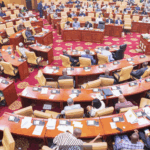
Majority and Minority MPs have clashed in Parliament over Ghana’s recent economic gains, as inflation declines and the cedi strengthens against major foreign currencies.
The National Democratic Congress (NDC) maintained that the current economic gains are the result of strategic decisions and policies implemented under the leadership of President John Mahama.
However, the New Patriotic Party (NPP) disagreed, arguing that the NDC is not presenting the full picture of the economy, which they claim has seen temporary improvements driven largely by artificial interventions.
Chairman of the Committee on Economy and Development and NDC MP, Eric Afful, praised the economy’s performance and attributed it to the NDC’s legacy policies.
“The headline inflation has declined consecutively within the year according to the Bank of Ghana by 2.6 percentage points to 21.2% in April 2025 and 18.3% in May 2025,” Mr Afful said in Parliament. “This resulted in reduction of price of goods and services in the country.
The primary fiscal balance on a commitment basis has also improved significantly in the first quarter of 2025. According to the report, at the end of March 2025, the stock of public debt stood at 769.4 billion Ghana cedis, representing 55% of GDP compared to 726.7 billion cedis, representing 61.8% of GDP at the end of December 2024.”
He further noted that, “The cedi has rebounded strongly against the major trading currencies driven by a combination of factors, including the tight monetary stance, ongoing fiscal consolidation, record reserves accumulation, strict enforcement of foreign exchange rules, and improved market sentiment.”
However, in a rebuttal, NPP MP and Ranking Member of the Economy and Development Committee, Kojo Oppong Nkrumah, questioned the sustainability of the gains and criticised the Majority caucus for what he described as misleading claims.
“There’s been an appreciation of the Ghanaian cedi, and nobody can say he’s unhappy about that. But what is the cause?” Mr Oppong Nkrumah asked. “Among other things, quite recently, the IMF has quite clearly explained part of what is happening, that the government has dumped about 1.4 billion dollars from our dollar reserves onto the market.”
He continued, “If a country has $1.4 billion of dollar reserves to dump onto the market to help its currency appreciate, two questions must be asked. The first, where did those reserves come from? And the second, how sustainable is it?”
He claimed that the government was using reserves inherited from the previous administration: “It is a matter of fact that in the six months of this administration, it has not generated $1.4 billion in terms of new additions to our gross international reserves.
The truth is that at the point of inheriting power, the previous administration had left over $8 billion of international reserves, part of which the new administration has drawn and dumped onto the market.”
Mr Oppong Nkrumah also criticised the government’s flagship programmes, saying, “They even announced recently that they have signed a contract to send over 2,000 Ghanaians to work abroad. We all know that no money has been released for these programmes, and so there are no real beneficiaries on the ground. So this argument of fiscal discipline that you want to tout as rhetoric, we encourage our colleagues, is not backed by the numbers.”
Meanwhile, the Minister of Energy and Green Transition, John Jinapor, also weighed in, urging colleagues to understand the economic principles at play.
“Is it true that inflation has improved? It has improved,” he admitted. “And so if you see prices going up, when they say inflation is low, it doesn’t mean prices are coming down. It simply means that the rate at which prices are going up has slowed down. He didn’t talk about disinflation. He didn’t talk about deflation. He said inflation is lowering. And that is a fact.”
On the performance of the cedi, he added: “Year-on-year, it is doing well. And to say that it has not translated, there’s something you call lag in economics, the lag or the transmission mechanism.”
He concluded that efforts must now shift toward job creation: “Having attained these positive indices, the next thing we should be looking at is how we can translate that to create jobs for the people of Ghana.”
In response, the Walewale MP, Dr Kabiru Mohammed, warned that the current appreciation of the cedi may be based on temporary interventions by the Bank of Ghana.
“Mr Speaker, one of the reasons that we are experiencing the appreciation of the cedi is fiscal policy. We admit that it contributes. But we have been reminding this government that much of the impact is due to Bank of Ghana’s direct intervention in the market, which is antithetical to the free liberal market we are operating,” he said.
“When you inject the dollar into the Ghanaian cedi, it creates a false sense that investors will think your cedi is doing well. In the actual case, it is not doing well. And the IMF has actually come to their country and they have mentioned that the Bank of Ghana must stop.”
He further argued that the reported improvement in Ghana’s debt-to-GDP ratio was not the result of economic growth but rather painful restructuring measures.
“The government has not paid any loan except those who have so agreed to pay. The government has actually contracted more loans. But the debt-to-GDP ratio is declining. Why? Because of the painful decision of Nana Addo Dankwa government to go for the debt restructuring and to go for the IMF support programme,” he said.
According to him, “The government has not done any job about the debt situation. Absolutely nothing. Yet the debt to GDP has moved to 54%. He needed to tell this House that it is decreasing because the government painfully took the debt restructuring programme. The government is gaining this momentum because of the intervention of Nana Akufo-Addo.”
